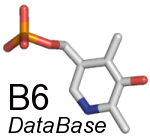|
|
| type |
Journal Article |
| authors |
Shah, S.; Li, J.; Moffatt, B. A.; Glick, B. R. |
| title |
Isolation and characterization of ACC deaminase genes from two different plant growth-promoting rhizobacteria |
| journal |
Can J Microbiol |
| Activity |
3.5.99.7 |
| Family |
3.5.99.7 |
| sel |
selected |
| ui |
9851025 |
| year |
(1998) |
| volume |
44 |
| number |
9 |
| pages |
833-43 |
| | |
|---|
| keywords |
Amino Acid Sequence |
| abstract |
We have recently proposed that one way that plant growth-promoting rhizobacteria (PGPR) stimulate plant growth is through the activity of the enzyme 1-aminocyclopropane-1-carboxylate (ACC) deaminase, which causes a lowering of plant ethylene levels resulting in longer roots. As part of an effort to understand the role of this enzyme in PGPR, the genes for ACC deaminase from two PGPR, Enterobacter cloacae CAL2 and UW4, have been isolated. These genes are highly homologous to the ACC deaminase genes from Pseudomonas strains 6G5 and F17 and similar to the ACC deaminase gene from Pseudomonas sp. strain ACP. The region downstream (i.e., at the 3'-terminal end) of the strain UW4 ACC deaminase gene has a potential hairpin-like transcription termination site. The regions upstream of the strains UW4 and CAL2 ACC deaminase genes contain putative ribosome-binding sites; however, the promoter sequences have not yet been identified. Southern hybridization experiments suggest that there is a single copy of the ACC deaminase gene in Enterobacter cloacae strains UW4 and CAL2 and that there may be several different types of ACC deaminase genes in different microbes. The cloned ACC deaminase gene can be expressed in Escherichia coli enabling this bacterium to grow on ACC as a sole source of nitrogen and confers upon both Escherichia coli and Pseudomonas spp. strains that are transformed with this gene the ability to promote the elongation of the roots of canola seedlings. |
| last changed |
2018/05/07 13:07 |
|











